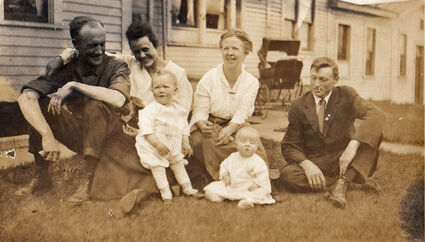On the Mark: A teacher worth fighting for
September 9, 2022
In the mid-1920s, my grandmother Ruth Lee Markusen began teaching at Cromwell High School. Although she had earned a degree from the University of Minnesota in English and social science (1910) and had taught grammar school in rural Minnesota for several years, she had most recently been a homemaker with two small boys at home.
But her husband, Marinus "Renus" Markusen, had contracted tuberculosis and had to close down his planing mill and stop his carpentry work. So, she went to work teaching English, sending sons Sidney and David to her parents in Stillwater so they would not be exposed to TB.
Teaching was a multifaceted job then, as it is now. Ruth was one of three women shepherding 14 seniors to graduation in 1929. By '31, she was one of 10 teachers, half of them women.
In addition to her English, social science, and biology classes, Ruth sponsored the annual yearbook (the Cromwellian), coached the junior and senior class plays, organized declamation, and served as school librarian and class advisor.
Ruth's reading standards were high. She read out loud in class - all of Charles Dickens' David Copperfield, for instance. Students learned a lot of demanding poetry and drilled in spelling and grammar. And as the librarian, Ruth created an extra-point system for reading books and writing reports. One student read all 1,100 pages of "Les Miserables."
Each May, high school students took a University of Minnesota-administered English essentials exam. In 1932, the Duluth Herald ran a photo of Mrs. Markusen with the news that Cromwell's 10th through 12th graders had placed eighth out of 123 schools from across the Midwest, including Michigan, Illinois, Wisconsin, Minnesota and the Dakotas.
About this time, when the Depression was at its worst, the school district was hard-pressed for money. The school board sought to lay off married women teachers, a society-wide phenomenon, on the grounds that their husbands could support them. Friends of Ruth and Renus fought back, pointing out that he was flat in bed and unable to work. Her job was saved.
In March of 1933, Cromwell tried something even more unorthodox. When at a board meeting some grumpy community people suggested firing teachers and hiring cheaper people, the school board put out for bid the teachers' jobs. The school received 1,500 applications, each of the hopefuls bidding against the rest for salary. Hilariously, school board members estimated it would require a week to open and read the letters, and they refused to do so, asserting that they were not paid for that sort of thing! Meanwhile, community residents wrote passionate letters to the Duluth newspaper and the Carlton County Vidette opposing the action. Here are some sample lines from among dozens my grandmother clipped:
"May I ask, what is our country coming to that such a low value is placed on education as this?" signed Common Sense, March 4, 1933, Duluth New Tribune.
"Our children are getting a fine training. We have an excellent school, capably handled, and an especially efficient group of teachers." signed Parents Who Believe In a Good School and Fairness, March 22, 1933, The Carlton County Vidette.
"It is a poor policy to get wages so low that a teacher has to sell insurance or mouse traps as a side issue." signed E.W. Dotten, March 21, 1933, The Carlton County Vidette.
And from an editorial in far-off Austin, Minnesota: "Of all the downright dirty tricks a kid could have pulled on him! I never heard of Cromwell, Minnesota before, but it certainly must be a cheap, messy little burg." Mower County News, March 23, 1933.
The overwhelming opposition, the task of sorting through the bids, and the embarrassing notoriety worked. On April 13, 1933, the Vidette reported that the Cromwell school board had rehired all its teachers for the coming year. They continued to work hard for relatively low pay - Ruth's final teacher's contract in 1947-48 came with a salary of $2,200 and permitted her two paid sick days a year.
Ruth was a gentle, but strict teacher. She established discipline with an economy of words, Dot Richards once told me. Ruth could focus on an unruly student and say simply, "Oh, James!" with a bit of disapprobation in her voice, and he would immediately cease. Once my father, who had returned for his senior year, shimmied up the flagpole not realizing that he'd be gazing into his mother's second-floor classroom. She swiftly threw up the sash and commanded, "David Markusen, you get down from there right now!"
Ruth favored the carrot over the stick. She worked with block grades, which meant that each student chose whether to go for an A, B, or C. "Why not go for the A," she would urge them.
More than her rigor, discipline and incentives, it was Ruth's ability to speak to the unique person in every student that really shone. At all-class reunions since 1980, Ruth's former students have told me wonderful stories.
"I was a terrible student," said one, "but when she read that Highwayman poem, I fell in love with words."
"She understood me," reflected another. "She encouraged me to write and go to college."
My grandmother died of uterine cancer in the winter of 1948. She worked as long as she could, even though Renus had recovered, because she loved teaching. In Superintendent Noll's address at her retirement event in November 1947, he stressed that Ruth had been "an ardent exponent of everyday good English and habitual reading of good literature as an aid in developing the character and personality of youth."
After the event (and required coffee hour), many members of the audience called at the home of Mrs. Markusen, who indeed did greet all guests with her pleasant smile and cheery "hello!"
I am so grateful for the all-class reunions. Listening to accounts such as those I have shared, I understood for the first time that my own skill as a teacher is a gift from my grandmother Ruth. My father was a patient, joyful teacher - in our home, in the woods, in his advice - and of course, he had learned from his mother. Goosebumps ran down my spine, right there in the old school corridor.
Columnist Ann Markusen is an economist and professor emerita at University of Minnesota.One of the five owners of the Pine Knot News, she lives in Red Clover Township north of Cromwell with her husband, Rod Walli.









